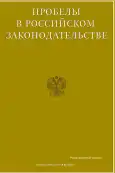Extremism: Difficulties of Definitions
- Authors: Klimenko T.M.1, Alchakov R.K.2, Urusova L.K.3
-
Affiliations:
- North Caucasian State Academy
- Investigation Department of the Ministry of Internal Affairs for the KChR
- North Caucasus Institute for Advanced Studies (branch) of the Krasnodar University of the Ministry of Internal Affairs of Russia
- Issue: Vol 15, No 4 (2022)
- Pages: 122-126
- Section: Articles
- URL: https://journal-vniispk.ru/2072-3164/article/view/147540
- ID: 147540
Cite item
Abstract
Keywords
Full Text
##article.viewOnOriginalSite##About the authors
Tauzhan Mikailovna Klimenko
North Caucasian State Academy
Email: tauzhank@list.ru
Dr.Sci.(Law), Associate Professor, Professor of the Department of Criminal Law Disciplines Cherkessk, Russia
Ramazan Khanafievich Alchakov
Investigation Department of the Ministry of Internal Affairs for the KChR
Email: lauraurusova@gmail.com
Colonel of Justice, Deputy Head of the Investigation Department Cherkessk, Russia
Laura Khabalovna Urusova
North Caucasus Institute for Advanced Studies (branch) of the Krasnodar University of the Ministry of Internal Affairs of Russia
Email: lauraurusova@gmail.com
Cand.Sci.(Pedagogics), Senior lecturer of the State and Civil Law disciplines Department Nalchik, Russia
References
- Arun Kundnani F. Extremism: The Journey of a Concept, Race & Class, Vol. 54, No. 2 (Oct-Dec 2020), pp. 13-20.
- Jenkins B. The study of terrorism: defining problems//Digest of law. - Santa Monica. 1992, No. 8. pp. 101-120.
- Dorrin F. Causes and consequences of terrorist acts// Law and law. - Cambridge. 2005. Volume 12. No. 3. S. 124-131.
- Kabanov P.A. Political extremism: causes and some preventive measures //Investigator. 2019. №3. pp. 24-29.
- Laker V.R. Terrorism, extremism, radicalism: a historical and critical study. Oxford University, 2017, p. 208.
- Novikov I. A. Youth radicalism as a factor in deviant behavior: socio-cultural analysis: author. diss…. cand. social Sciences: 22.00.06. M., 2016. P.9
- Urusova, L.Kh. Aggressiveness as a form of manifestation of deviant behavior // Bulletin of the Vladimir State University. Alexander Grigorievich and Nikolai Grigorievich Stoletov. Series: Pedagogical and psychological sciences. 2016. No. 25 (44). pp. 128-132.
- Urusova, L.Kh. Terrorism: difficulties of definitions / L.Kh. Urusova // Gaps in Russian legislation. 2020. V.13. No. 4. pp. 87-90.
- Urusova, L.Kh., Kurochkin A.S. Conceptual difficulties in determining the legal category of aggression / L.Kh. Urusova, A.S. Kurochkin // Philosophy of Law. 2020. No. 3 (94). pp. 70-74.
- Harrison T. Problems of extremist actions//European scientific journal of law. - Delta J. Press. 2019. Volume 5. No. 1. S. 183-189.
Supplementary files








